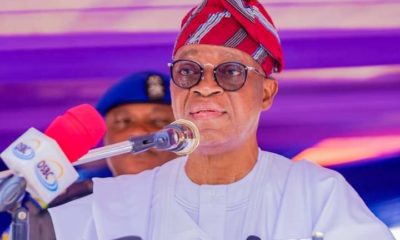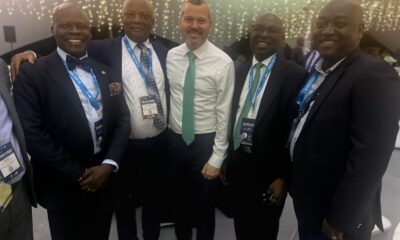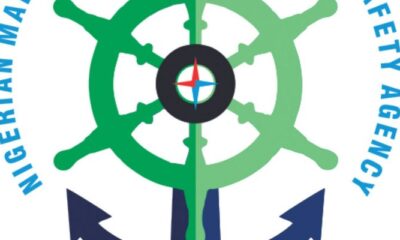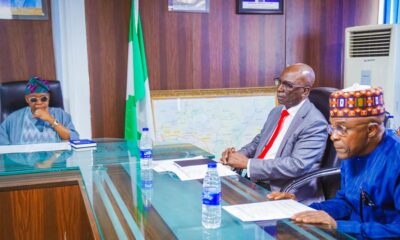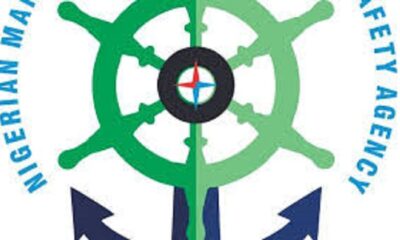Maritime
Seafarers, Lifeblood Of Maritime Industry – Oyetola
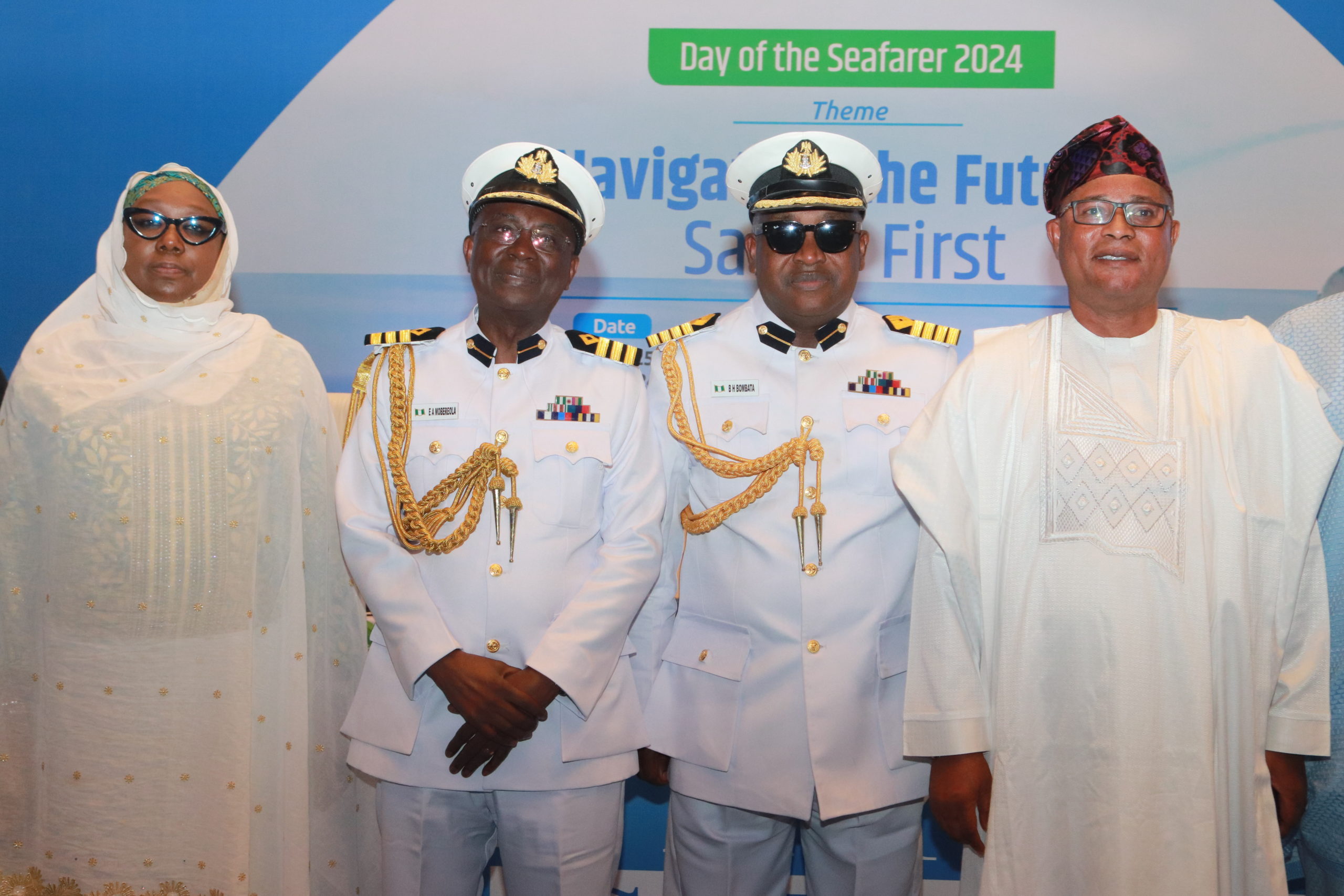
Seafarers are the lifeblood of the maritime industry, which is essential to the success of the Blue Economy.
This opinion was expressed by the Minister of Marine and Blue Economy, Adegboyega Oyetola in Lagos during the commemoration of the 2024 Day of the Seafarer on Tuesday.
In the same vein, the Director General of the Nigerian Maritime Administration and Safety Agency (NIMASA), Dr. Dayo Mobereola, opined that Nigeria has the potential to be a maritime powerhouse, with the right policies in place.
The Minister, assured in his keynote address that the Federal Government was committed to the development of the Nigerian maritime sector.
He stated that the theme for this year’s celebration; “Navigating the Future, Safety First,” aligns with the vision of the Ministry of the Marine and Blue Economy.
In his words, “Seafarers are the lifeblood of the maritime industry. They endure the isolation of the open sea, the unpredictability of weather, and the myriads of challenges that come with navigating some of the world’s busiest and most perilous waters. Their resilience, dedication, and unwavering commitment ensure that goods and resources reach every corner of our planet, supporting livelihoods and promoting international trade.”
The Minister who was represented by the Director, Maritime Safety and Security in the Ministry of Marine and Blue Economy, Babatunde Bombata, gave the assurance that the Federal Government remains committed to collaborating with industry stakeholders and steadfast in advocating for the rights and welfare of Nigerian seafarers.
“We are committed to providing comprehensive training programmes, enforcing stringent safety regulations, and offering continuous support to ensure our seafarers are among the best trained and most resilient in the world. We are dedicated to building on this foundation, ensuring that Nigerian seafarers are equipped to meet the challenges and opportunities of the modern maritime landscape”, he said.
Furthermore, he pledged the Ministry’s resolve to prioritize the growth and development of the Marine and Blue Economy Sector, noting that it’s development of the sector will greatly benefit all Nigerians and future generations.
He added, “We are working closely with stakeholders in the private sector, international organizations, and other government agencies to create an enabling environment for the growth of the Maritime and Blue Economy.”
He also used the opportunity to call for stakeholders’ support in the development of the sector, noting that the Ministry cannot undertake the task alone. “This celebration of World Seafarers Day presents a unique opportunity to explore emerging issues and propose innovative solutions to the challenges facing the sector. We must remain resolute and deliberate in promoting the growth and development of the Marine and Blue Economy Sector, as the Ministry cannot achieve this alone”.
Similarly, the Chairman of the Senate Committee on Maritime Safety, Education and Administration, along with his counterpart in the House of Representatives, applauded the seafarers for their resilience and assured them of the Government’s continuous support to guarantee their well-being.
They assured of the readiness of the National Assembly to work with NIMASA and other stakeholders to support any legislation aimed at advancing the rights and safety of all seafarers. “Together, let us continue to strive for a maritime world that is equitable and inclusive for all,” Senator Wasiu Eshinlokun stated.
On his part, Dr. Mobereola, acknowledged the uniqueness of the profession and the challenges faced. He noted that the theme for this year’s celebration,
“Navigating the Future: Safety First,” is a call to address the challenging conditions seafarers face while navigating the sea. He emphasized the need for greater focus on their well-being and safety at sea.
“We recognize the humongous challenges Seafarers face while sailing; ranging from piracy, kidnapping, encounter at war zones exposure to health risks and unfair treatment. Notwithstanding all these, Nigeria has recorded zero piracy incidents in the last two years; we will not rest on our oars as the life of every seafarer matters”, Mobereola stated.
He assured that the Agency will continue to collaborate with both local and international organizations to address global issues affecting seafarers and ensure their safety while navigating the future.
“Nigeria has the young population to compete with other countries whose seafarers contribute immensely to their Gross Domestic Product (GDGDP. Hence, the Agency will continue to invest in training and capacity-building programs to enhance seafarers’ skills, welfare and employment opportunities”.
Dr. Mobereola used the opportunity to inform stakeholders that the Agency is working tirelessly to strengthen its legal frameworks by domesticating all Maritime Labour related ILO Conventions ratified by Nigeria.
“These conventions include the Maritime Labour Convention (MLC) 2006 as amended, the Seafarers Identity Document (SID) Convention as amended, and the Dock Work Convention”, he said.
“We will continue to focus on implementing programs and projects to improve seafarers’ welfare, including mental health support, safety training, and emergency assistance. Also we will continue to eliminate substandard vessels from our waters and ensure wrecks are removed to aid navigation and safety for our seafarers”, he assured.
He also mentioned that many beneficiaries of our Nigerian Seafarers Development Programme (NSDP) are currently undergoing mandatory sea-time training aboard ocean-going vessels.
The Agency is collaborating with key stakeholders like the NLNG Shipping and Marine Services Limited, the Nigerian Content Development and Monitoring Board (NCDMB), Indigenous Shipping Companies and the Nigeria Immigration Service (NIS), all geared towards boosting the capacity of the seafarers.
Katie Higginbottom from the International Transport Federation (ITF), who joined virtually, emphasized that seafarers are a critical part of the maritime sector.
She also commended NIMASA’s renewed collaboration with the ITF to ensure seafarers receive the necessary attention from their respective governments.
Prof Max Mejia, President of the World Maritime University, who also joined virtually, expressed gratitude to the seafarers and described them as the modern day heroes who deserve celebration.
In their goodwill messages, stakeholders took turns to praise the invaluable contributions of seafarers to the global economy, urging governments to continue supporting them through favorable policies that will enhance their wellbeing in line with the Maritime Labour Convention (MLC) 2006.
They include President General of the Maritime Workers Union of Nigeria, Comrade Adewale Adeyanju; President of the Shipowners Association of Nigeria; Flag Officer Commanding Western Naval Command, Rear Admiral Hassan; among others.”
The International Day of the Seafarer is celebrated annually on June 25 to recognize the contributions of seafarers to international seaborne trade and the world economy as a whole. The day is organized by the International Maritime Organization and recognized by the United Nations as an observance day.
Maritime
Maritime Stakeholders Back Bill For Nigeria Coast Guard At Public Hearing
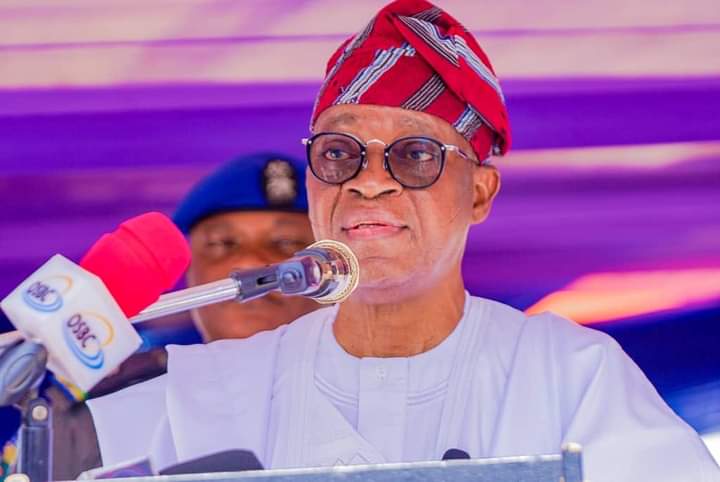
Stakeholders and experts in Nigeria’s maritime sector have expressed support for the Coast Guard Bill before the National Assembly, with many describing the proposed legislation as a boost to the federal government’s efforts in securing the maritime space.
At a public hearing convened by the Senate Committee on Marine Transport to discuss the bill for the establishment of the Nigeria Coast Guard (NCG), stakeholders presented varying views, with the majority supporting the creation of the NCG.
The majority of presentations voiced strong support for the establishment of the Coast Guard, with notable endorsements from prominent figures including Dr. Olisa Agbakoba, SAN; Dr. Ade Dosunmu, MON, former Director General of NIMASA; Mrs. Jean Anishere, SAN, representing the Nigeria Bar Association; and Rear Admiral Ekwerre U. Ekwerre (Rtd), former Flag Officer Commanding the Training Command of the Nigerian Navy.
ALSO READ: Like America, Like Ghana: Opposition Defeats Ruling Party In Presidential Election
Dr. Olisa Agbakoba described the bill as timely but emphasized the need for professional input to address certain concerns within the draft. He expressed his willingness to assist in this process. Dr. Ade Dosunmu offered full support for the bill, suggesting that the Nigerian Navy should focus on blue-water operations and national defense against external threats, while the Coast Guard should address maritime crimes and incidents along Nigeria’s extensive 855-kilometer coastline using more adaptable resources. He referenced successful maritime nations such as India, Singapore, China, the United States, Japan, Egypt, Morocco, and the United Arab Emirates, all of which have well-defined roles for both the Navy and Coast Guard.
However, Dr. Dosunmu cautioned against assigning functions such as hydrography and oceanographic research to the Coast Guard, as these responsibilities are already managed by other agencies, and incorporating them could divert focus from the Coast Guard’s primary mission.
Jean Anishere, SAN, articulated her support for the bill while highlighting certain ambiguities that must be resolved before it can be enacted. She pointed out specific provisions in the bill that require clarification and further refinement.
Retired Rear Admiral Ekwerre U. Ekwerre addressed concerns raised by the Nigerian Navy and advocated that the Navy should concentrate on defense, showcasing military strength, and conducting diplomatic operations within territorial waters and the Exclusive Economic Zone (EEZ). He asserted that the Coast Guard should be responsible for enforcing maritime laws in the nation’s inland waters.
In summary, while the majority of stakeholders endorsed the establishment of the Nigeria Coast Guard, they also called for careful consideration of the bill’s provisions to ensure clarity and effectiveness in its implementation.
Maritime
How Innovative Financing Would Aid Africa’s Maritime Sector – NIMASA DG
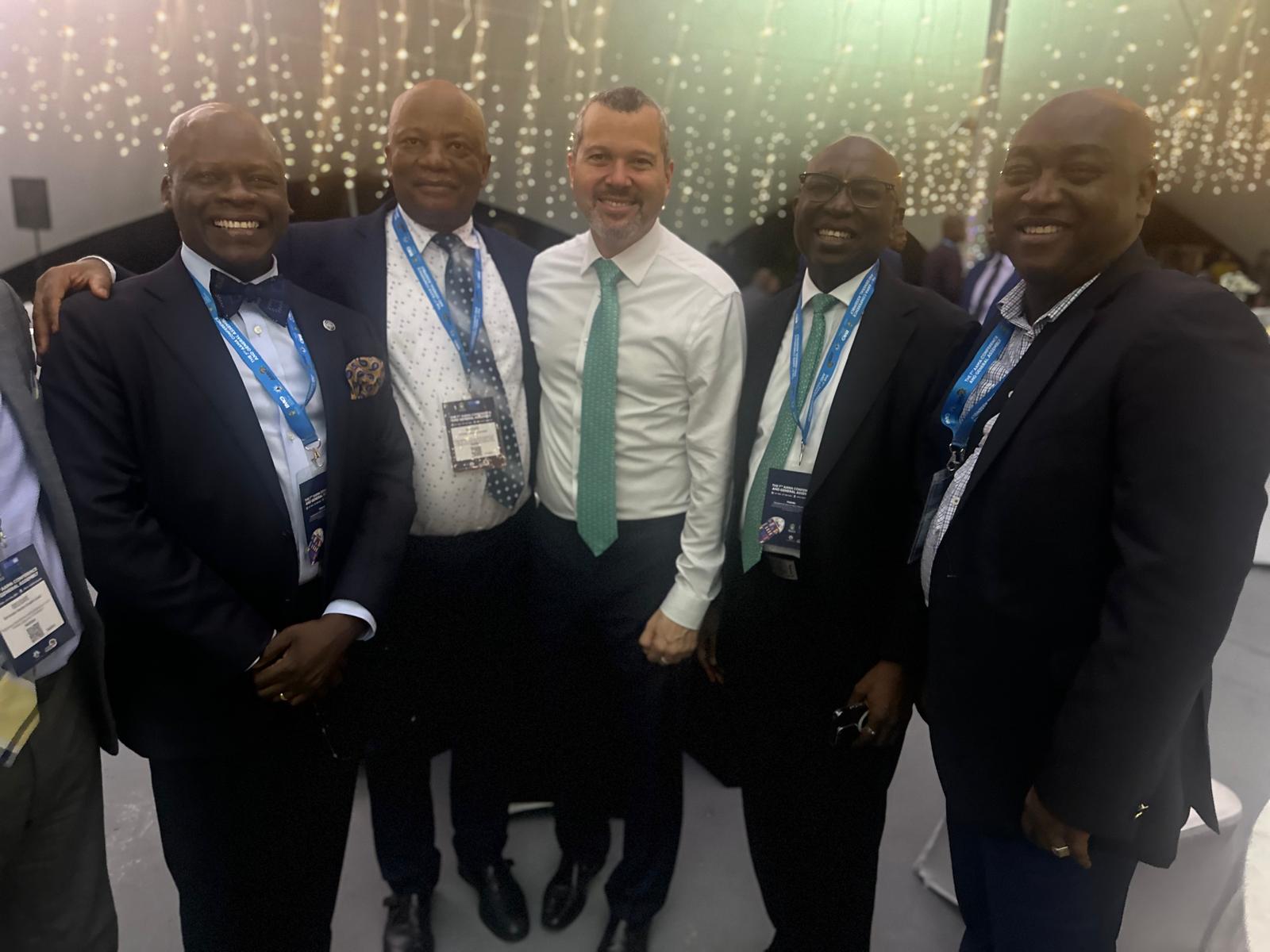
Innovative financing models have been identified as the vital catalyst for achieving sustainable development in the African Maritime industry.
The Director General of the Nigerian Maritime Administration and Safety Agency (NIMASA), Dr. Dayo Mobereola, made the declaration at the 7th Association of African Maritime Administrations (AAMA) conference in Dar es Salaam, Tanzania.
He assured attendees of Nigeria’s commitment to advancing a future where Africa’s maritime sector thrives sustainably.
In his words, “Nigeria is committed to collaborating on technology and innovation to enhance safety, security, decarbonization, and the marine environment for a sustainable future.”
According to him, the conference presents a pivotal opportunity to address our shared challenges, particularly those related to sustainable energy, regional security, and economic growth.
ALSO READ: Tinubu, Ramphosa Co-Chair Bi-National Commission’s 11th Session
“We are here to advocate for innovative financing models and international support that will facilitate sustainable growth. As Nigeria pursues infrastructure development and digital transformation within our maritime sector, we call on our regional and international partners to support these efforts through technical and financial backing.
“Our priorities at the AAMA conference include exploring collaborative avenues to enhance maritime safety and security. By reinforcing our adherence to frameworks like the Djibouti and Yaoundé Codes of Conduct, we aim to solidify Nigeria’s role in combating piracy and maritime crime across West Africa,” he stated.
The AAMA was established to lay a firm foundation for regular consultations, enabling African maritime administrations to build joint positions on issues of common concern in the maritime sector.
When Nigeria hosted the 3rd AAMA conference in 2017, a master plan was developed outlining the measures necessary to advance the maritime agenda as envisioned in the African Maritime Transport Charter. The Association has also created a platform to strengthen cooperation at the regional, continental, and international levels, harmonizing policies and goals essential for the growth of the African maritime sector.
Maritime
Oyetola Counts On Nat’l Marine and Blue Economy Policy To Chart New Course For Dev’t

The Honourable Minister of Marine and Blue Economy, Adegboyega Oyetola is of the view that a National Policy on Marine and Blue Economy is essential for the development of the Nigerian maritime sector.
Biztellers reports that Oyetola shared the view, on Tuesday, while declaring open a stakeholders’ validation session aimed at developing the National Policy on Marine and Blue Economy in Nigeria, in Lagos.
The former Osun State Governor emphasized that the National Policy will create a sustainable pathway for economic growth in fisheries, aquaculture, renewable energy, tourism, and seabed mining, while also ensuring environmental sustainability.
He further noted the need for a robust National Policy to address challenges in the sector, including environmental degradation and illegal activities such as Illegal, Unreported, and Unregulated (IUU) fishing.
ALSO READ: Obi Congratulates NNPC Ltd On Port Harcourt Refinery
In his words, “A robust National Policy will ensure that we address these issues through a comprehensive framework that aligns with international best practices while safeguarding our marine resources for future generations.
“It is worth noting that Nigeria has achieved notable progress in maritime governance, including the ratification and domestication of international protocols and conventions. These measures have strengthened our safety and security framework, resulting in a remarkable three-year period with zero incidents of piracy in our waters. Nonetheless, the recurring boat mishaps underscore the pressing need for immediate action.
“This policy seeks to implement comprehensive strategies to ensure the safety of all waterways. However, challenges such as the recent spate of boat mishaps demand urgent attention. Consequently, this policy aims to establish comprehensive measures that will enhance safety across our waterways.
“As we develop this policy, the Ministry remains committed to repositioning Nigeria as a dominant player in the marine and blue economy, both regionally and globally. We are also pursuing Nigeria’s candidacy for election to Category C of the International Maritime Organization (IMO), which underscores our determination to strengthen our voice in global maritime governance”.
In his welcome address, the Permanent Secretary of the Ministry, Olufemi Oloruntola, noted that the validation workshop is a key step in shaping the National Policy on Marine and Blue Economy — a framework designed to address Nigeria’s specific needs and aspirations while embracing sustainable development principles. “It provides an opportunity for stakeholders to review, refine, and enrich the draft policy through a participatory and inclusive approach,” he said.
The draft policy, which consists of nine parts, offers an elaborate overview of our country’s marine and blue economic endowments and their current state. It affirms our mandate, vision, and mission, setting the stage for the policy’s objectives and aspirations. It further dissects these aspirations into five broad parts of legal and institutional framework; maritime transport, trade and shipping; fisheries and aquaculture; marine abiotic resources; and marine innovation and technology. It also identifies a range of cross-cutting issues and concludes with an assessment of stakeholders to support the implementation structure. Overall, it is a comprehensive document.
Also present at the event were the Chief Executive Officers of all the agencies under the Ministry, including Dr. Dayo Mobereola, Director General, Nigerian Maritime Administration and Safety Agency; Abubakar Dantsoho, Managing Director, Nigerian Ports Authority; Barrister Akutah Pius, Executive Secretary, Nigerian Shippers Council; and Bola Oyebamiji, Managing Director, National Inland Waterways Authority.
Other attendees included Funmi Folorunsho, President, African Shipowners Association; Engr. Greg Ogbeifun, Managing Director, Starz Marine; and the President, National Association of Stevedoring Companies, among other stakeholders.

